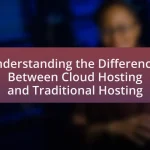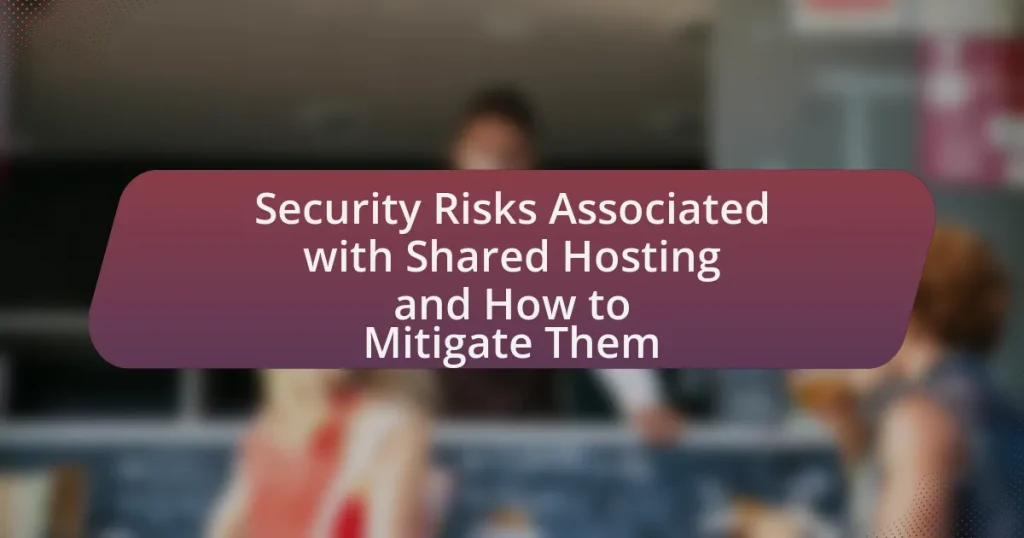Shared hosting involves multiple users sharing the same server resources, which introduces various security risks, including cross-site contamination, inadequate isolation, and susceptibility to attacks such as DDoS and malware infections. The article outlines the common vulnerabilities associated with shared hosting, including the types of attacks prevalent in these environments, the implications of data breaches, and the legal consequences that can arise. It emphasizes the importance of implementing strong security measures, such as regular software updates, strong password management, and the use of security plugins, to mitigate these risks effectively. Additionally, the article discusses best practices for users to enhance their security posture and the role of hosting providers in maintaining a secure shared environment.
What are the security risks associated with shared hosting?
Shared hosting presents several security risks, primarily due to multiple users sharing the same server resources. One significant risk is the potential for cross-site contamination, where vulnerabilities in one website can be exploited to affect others on the same server. Additionally, shared hosting environments often lack robust security measures, making them more susceptible to attacks such as Distributed Denial of Service (DDoS) and malware infections. Furthermore, inadequate isolation between accounts can lead to unauthorized access, where one user may gain access to another’s data. According to a study by the Ponemon Institute, 60% of organizations reported experiencing a data breach due to vulnerabilities in shared hosting environments, highlighting the critical need for enhanced security protocols in these setups.
How does shared hosting increase vulnerability to attacks?
Shared hosting increases vulnerability to attacks primarily because multiple users share the same server resources, which can lead to security weaknesses. When one website on a shared server is compromised, attackers can exploit vulnerabilities to access other sites on the same server due to inadequate isolation between accounts. For instance, a study by the University of California, Berkeley, found that shared hosting environments often lack robust security measures, making them attractive targets for cybercriminals. Additionally, if one user fails to implement proper security protocols, it can create a domino effect, exposing all users on that server to potential threats.
What types of attacks are most common in shared hosting environments?
The most common types of attacks in shared hosting environments include cross-site scripting (XSS), SQL injection, and denial-of-service (DoS) attacks. These attacks exploit vulnerabilities in web applications hosted on shared servers, where multiple users share the same resources. For instance, XSS allows attackers to inject malicious scripts into web pages viewed by other users, potentially compromising their data. SQL injection targets databases by inserting malicious SQL queries, which can lead to unauthorized access to sensitive information. Denial-of-service attacks overwhelm server resources, causing downtime for all users on the shared hosting platform. According to a report by the Ponemon Institute, 60% of organizations experienced a web application attack in the past year, highlighting the prevalence of these threats in shared hosting environments.
How can the presence of other users on the same server pose risks?
The presence of other users on the same server can pose risks due to potential security vulnerabilities that arise from shared resources. In shared hosting environments, if one user experiences a security breach, such as a malware infection, it can compromise the entire server, affecting all users. For instance, a study by the University of California, Berkeley, found that shared hosting environments are particularly susceptible to cross-site scripting (XSS) and cross-site request forgery (CSRF) attacks, which can exploit weaknesses in one user’s application to gain unauthorized access to another user’s data. This interconnectedness means that poor security practices by one user can lead to data breaches or service disruptions for others on the same server.
What are the implications of data breaches in shared hosting?
Data breaches in shared hosting can lead to significant security risks, including unauthorized access to sensitive data, loss of customer trust, and potential legal liabilities. When multiple users share the same server resources, a vulnerability in one account can compromise others, exposing personal information and financial data. According to a 2020 report by Verizon, 22% of data breaches involved web applications, highlighting the risks associated with shared environments. Additionally, the financial impact can be severe; the average cost of a data breach is estimated at $3.86 million, as reported by IBM in 2020. These implications underscore the importance of implementing robust security measures and choosing reputable hosting providers to mitigate risks.
How can a data breach affect multiple websites on shared hosting?
A data breach can affect multiple websites on shared hosting due to the shared resources and vulnerabilities inherent in this environment. In shared hosting, multiple websites operate on the same server, which means that if one website is compromised, attackers can exploit the server’s configuration or software vulnerabilities to access other websites hosted on the same server. For instance, if a hacker gains access to the server through one website’s weak security, they may be able to manipulate server settings or access sensitive data from other websites, leading to widespread data exposure. This risk is heightened by the fact that many shared hosting environments do not implement strict isolation between accounts, allowing breaches to propagate easily across multiple sites.
What legal consequences can arise from data breaches in shared hosting?
Data breaches in shared hosting can lead to significant legal consequences, including regulatory fines, lawsuits, and liability for damages. Organizations may face penalties under laws such as the General Data Protection Regulation (GDPR), which can impose fines up to 4% of annual global revenue for non-compliance. Additionally, affected individuals may file class-action lawsuits seeking compensation for damages resulting from the breach. The legal ramifications can extend to reputational harm, which can further impact business operations and customer trust.
Why is resource allocation a security concern in shared hosting?
Resource allocation is a security concern in shared hosting because multiple users share the same server resources, which can lead to vulnerabilities. When one account consumes excessive resources, it can degrade the performance of other accounts, potentially exposing them to denial-of-service attacks. Additionally, if one user’s application is compromised, it may allow attackers to access or exploit the resources of other users on the same server, increasing the risk of data breaches. This interconnectedness means that poor resource management can directly impact the security posture of all tenants on the shared hosting environment.
How can resource overuse lead to security vulnerabilities?
Resource overuse can lead to security vulnerabilities by overwhelming system resources, which can result in degraded performance and increased susceptibility to attacks. When resources such as CPU, memory, and bandwidth are excessively consumed, legitimate users may experience slow response times or service outages, creating opportunities for malicious actors to exploit these weaknesses. For instance, a Distributed Denial of Service (DDoS) attack can be more effective against a system already strained by resource overuse, as it may not have the capacity to handle additional traffic. Furthermore, resource overuse can lead to misconfigurations or inadequate security measures, as administrators may prioritize immediate performance issues over security protocols, increasing the risk of unauthorized access or data breaches.
What measures can be taken to manage resource allocation effectively?
To manage resource allocation effectively in shared hosting environments, implementing resource monitoring tools is essential. These tools provide real-time data on resource usage, enabling administrators to identify bottlenecks and allocate resources dynamically based on demand. For instance, using tools like cPanel or Plesk allows for tracking CPU, memory, and bandwidth usage, which helps in making informed decisions about resource distribution. Additionally, setting up resource limits for each account can prevent any single user from monopolizing server resources, thereby ensuring fair access for all users. This approach is supported by industry best practices, which emphasize the importance of monitoring and limiting resource usage to maintain server performance and security.
How can users mitigate security risks in shared hosting?
Users can mitigate security risks in shared hosting by implementing strong passwords and regularly updating them. Strong passwords reduce the likelihood of unauthorized access, while regular updates ensure that any potential vulnerabilities are addressed promptly. Additionally, users should utilize security plugins and firewalls to enhance their website’s defenses against attacks. Regular backups are also crucial, as they allow users to restore their sites quickly in case of a security breach. Furthermore, keeping software and applications up to date minimizes the risk of exploitation through known vulnerabilities. By following these practices, users can significantly lower their exposure to security threats in a shared hosting environment.
What best practices should be followed for securing shared hosting accounts?
To secure shared hosting accounts, users should implement strong passwords, regularly update software, and utilize security plugins. Strong passwords reduce the risk of unauthorized access, while regular software updates patch vulnerabilities that could be exploited by attackers. Security plugins can provide additional layers of protection, such as firewalls and malware scanning, which are essential in a shared environment where multiple users may be at risk. According to a study by the Ponemon Institute, 60% of data breaches are linked to weak or stolen passwords, highlighting the importance of robust password practices.
How important is strong password management in shared hosting?
Strong password management is crucial in shared hosting due to the increased risk of unauthorized access to multiple accounts on the same server. In shared hosting environments, multiple users share the same resources, making it easier for attackers to exploit weak passwords and gain access to sensitive data. According to a study by the Ponemon Institute, 81% of data breaches are linked to weak or stolen passwords, highlighting the importance of implementing strong password policies. Effective password management practices, such as using complex passwords, regularly updating them, and employing two-factor authentication, significantly reduce the likelihood of security breaches in shared hosting scenarios.
What role does regular software updates play in security?
Regular software updates are crucial for maintaining security as they patch vulnerabilities that could be exploited by attackers. These updates often include fixes for known security flaws, which, if left unaddressed, can lead to unauthorized access, data breaches, or malware infections. For instance, a study by the Ponemon Institute found that 60% of data breaches are linked to unpatched vulnerabilities. Therefore, consistently applying software updates significantly reduces the risk of security incidents in shared hosting environments.
What security features should be considered when choosing a shared hosting provider?
When choosing a shared hosting provider, essential security features to consider include SSL certificates, firewalls, malware scanning, and regular backups. SSL certificates encrypt data transmitted between the user and the server, ensuring secure connections. Firewalls protect against unauthorized access and attacks, while malware scanning detects and removes harmful software. Regular backups safeguard data against loss due to breaches or failures. These features collectively enhance the security posture of shared hosting environments, mitigating risks associated with shared resources.
How can SSL certificates enhance security in shared hosting?
SSL certificates enhance security in shared hosting by encrypting data transmitted between users and the server, which protects sensitive information from interception. This encryption ensures that personal data, such as login credentials and payment information, remains confidential, reducing the risk of data breaches. Additionally, SSL certificates authenticate the identity of the website, helping to prevent phishing attacks that can exploit shared hosting environments. According to a study by Google, HTTPS adoption, which is facilitated by SSL certificates, has led to a significant decrease in man-in-the-middle attacks, further validating the importance of SSL in enhancing security for shared hosting.
What types of firewalls and security protocols should be in place?
The types of firewalls that should be in place include network firewalls, application firewalls, and next-generation firewalls. Network firewalls monitor and control incoming and outgoing network traffic based on predetermined security rules, while application firewalls filter specific applications or services, providing more granular control. Next-generation firewalls combine traditional firewall capabilities with advanced features like intrusion prevention systems and deep packet inspection.
In terms of security protocols, Transport Layer Security (TLS), Secure Sockets Layer (SSL), and Internet Protocol Security (IPsec) are essential. TLS and SSL encrypt data transmitted over networks, ensuring secure communication, while IPsec secures Internet Protocol communications by authenticating and encrypting each IP packet in a communication session.
These firewalls and protocols are critical in mitigating security risks associated with shared hosting, as they protect against unauthorized access, data breaches, and various cyber threats.
How can users monitor their shared hosting environment for security threats?
Users can monitor their shared hosting environment for security threats by implementing regular security audits and utilizing monitoring tools. Regular security audits involve checking for vulnerabilities, outdated software, and misconfigurations that could be exploited by attackers. Monitoring tools, such as intrusion detection systems (IDS) and web application firewalls (WAF), provide real-time alerts on suspicious activities and potential breaches. Additionally, users should regularly review access logs to identify unauthorized access attempts, which can indicate security threats. These practices help maintain a secure shared hosting environment by proactively identifying and addressing vulnerabilities.
What tools are available for monitoring shared hosting security?
Tools available for monitoring shared hosting security include intrusion detection systems (IDS), web application firewalls (WAF), and security information and event management (SIEM) solutions. Intrusion detection systems, such as Snort, analyze network traffic for suspicious activity, while web application firewalls like ModSecurity protect web applications by filtering and monitoring HTTP traffic. Security information and event management solutions, such as Splunk, aggregate and analyze security data from various sources to identify potential threats. These tools collectively enhance the security posture of shared hosting environments by providing real-time monitoring and threat detection capabilities.
How can users respond to security incidents effectively?
Users can respond to security incidents effectively by promptly identifying the incident, containing the threat, and reporting it to the appropriate authorities or support teams. Quick identification allows users to assess the nature and scope of the incident, while containment measures, such as isolating affected systems, prevent further damage. Reporting ensures that experts can investigate and mitigate the issue, which is crucial in shared hosting environments where multiple users may be affected. According to the Cybersecurity & Infrastructure Security Agency (CISA), timely reporting of incidents can significantly reduce the impact and recovery time, highlighting the importance of a structured response plan.
What are the common misconceptions about security in shared hosting?
Common misconceptions about security in shared hosting include the belief that shared hosting is inherently insecure, that all users on a shared server can access each other’s data, and that shared hosting does not offer adequate security measures. In reality, while shared hosting does present certain risks due to resource sharing, reputable hosting providers implement robust security protocols, including firewalls, malware scanning, and isolation techniques to protect user data. Additionally, users cannot access each other’s files due to strict permissions and user account isolation enforced by the server’s operating system. According to a study by the Hosting Security Alliance, many security breaches in shared hosting environments are due to user negligence rather than the hosting model itself, highlighting the importance of user responsibility in maintaining security.
Why do some believe shared hosting is inherently secure?
Some believe shared hosting is inherently secure because it often includes managed security features provided by the hosting company. These features can include regular software updates, firewalls, and intrusion detection systems that protect all users on the server. Additionally, shared hosting environments typically have a team of security experts monitoring for vulnerabilities and threats, which can enhance overall security compared to unmanaged hosting solutions.
What factors contribute to the false sense of security in shared hosting?
The false sense of security in shared hosting primarily arises from the misconception that shared environments provide adequate isolation and security for all users. Users often believe that the hosting provider’s security measures, such as firewalls and monitoring, are sufficient to protect their data, despite the reality that vulnerabilities in one account can compromise others on the same server. Additionally, the lack of awareness about the shared nature of resources leads users to underestimate the risks associated with potential attacks, such as cross-site scripting or SQL injection, which can exploit weaknesses in poorly secured websites. Statistics indicate that shared hosting accounts are more susceptible to breaches, as evidenced by reports showing that over 70% of web hosting security incidents involve shared hosting environments.
How does the perception of shared hosting security differ from reality?
The perception of shared hosting security often suggests that it is inherently unsafe due to multiple users sharing the same server resources, leading to a belief that vulnerabilities from one site can compromise others. In reality, while shared hosting does present certain risks, reputable hosting providers implement robust security measures, such as firewalls, malware scanning, and regular updates, to mitigate these risks effectively. According to a study by the Hosting Security Alliance, 70% of security incidents in shared hosting environments can be prevented through proper configuration and management, demonstrating that the actual security of shared hosting can be significantly enhanced beyond common perceptions.
What are the risks of neglecting security in shared hosting?
Neglecting security in shared hosting exposes users to significant risks, including data breaches, malware infections, and unauthorized access. In shared hosting environments, multiple users share the same server resources, which increases the likelihood that vulnerabilities in one account can be exploited to compromise others. For instance, if one website on a shared server is hacked, attackers can potentially access sensitive data from other sites hosted on the same server due to inadequate isolation. According to a report by the Ponemon Institute, 60% of small businesses that experience a data breach go out of business within six months, highlighting the severe consequences of such security oversights. Additionally, shared hosting often lacks robust security measures, making it easier for attackers to deploy malicious software that can affect all users on the server.
How can ignoring security measures lead to significant losses?
Ignoring security measures can lead to significant losses by exposing systems to cyberattacks, data breaches, and financial fraud. For instance, a study by IBM found that the average cost of a data breach in 2021 was $4.24 million, highlighting the financial impact of inadequate security. Additionally, organizations that neglect security protocols may face reputational damage, loss of customer trust, and potential legal liabilities, further compounding their financial losses.
What are the long-term consequences of poor security practices in shared hosting?
The long-term consequences of poor security practices in shared hosting include data breaches, loss of customer trust, and potential legal liabilities. Data breaches can lead to unauthorized access to sensitive information, resulting in financial losses and reputational damage for businesses. According to a study by IBM, the average cost of a data breach in 2021 was $4.24 million, highlighting the financial impact of inadequate security measures. Additionally, loss of customer trust can result in decreased user engagement and revenue, as customers are less likely to use services perceived as insecure. Legal liabilities may arise from non-compliance with data protection regulations, such as GDPR, which can impose hefty fines on organizations that fail to protect user data adequately.
What practical steps can users take to enhance security in shared hosting?
To enhance security in shared hosting, users should implement strong passwords and enable two-factor authentication. Strong passwords reduce the risk of unauthorized access, while two-factor authentication adds an additional layer of security by requiring a second form of verification. Additionally, users should regularly update their software and applications to patch vulnerabilities, as outdated software can be an easy target for attackers. Utilizing secure file permissions and regularly backing up data further protects against data loss and unauthorized access. According to a report by the Cybersecurity & Infrastructure Security Agency, 85% of breaches involve human error, highlighting the importance of user vigilance in maintaining security.
How can regular security audits improve shared hosting safety?
Regular security audits enhance shared hosting safety by identifying vulnerabilities and ensuring compliance with security standards. These audits systematically evaluate the hosting environment, uncovering potential weaknesses such as outdated software, misconfigurations, and unauthorized access points. For instance, a study by the Ponemon Institute found that organizations conducting regular security audits experienced 50% fewer security breaches compared to those that did not. By addressing these vulnerabilities proactively, shared hosting providers can significantly reduce the risk of data breaches and improve overall security posture.
What are the benefits of using additional security plugins or services?
Using additional security plugins or services enhances the protection of websites hosted on shared servers by providing layered security measures. These plugins and services can offer features such as malware scanning, firewall protection, and intrusion detection, which are essential for identifying and mitigating threats that are prevalent in shared hosting environments. For instance, according to a report by the Cybersecurity & Infrastructure Security Agency, websites on shared hosting are more vulnerable to attacks due to the shared resources, making additional security measures critical for safeguarding sensitive data and maintaining website integrity.










